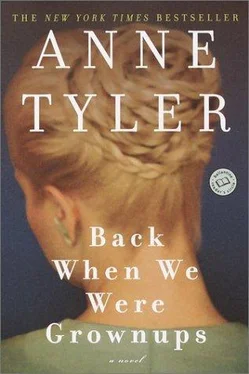Last of all, she blotted her face with powder, brushed her eyelashes with mascara, and applied a coat of lipstick the same shade of red as her shoes. But she wiped most of the lipstick off again, because she decided it made her look garish.
After that she sat down in the rear parlor, since it was only four-thirty and she didn’t have to leave until six. She folded her hands in her lap and did nothing, gazing straight ahead and trying to remember not to touch her eyes so that she wouldn’t end up looking like a raccoon. From time to time Poppy poked his head in and stared at her, but mercifully, he asked no questions. She had set out a cold supper earlier and told him to eat when he liked. Around five-thirty she heard a chair scrape across the kitchen linoleum, followed by the clinking of cutlery against china, and she thought of going out to keep him company but instead she continued sitting there. For one thing, she felt the need to hang on to her composure. For another, talking to Poppy would wear away what was left of her lipstick.
At ten till six she made one last trip to the bathroom, and then she gave Poppy a wave from the kitchen doorway. “Night-night,” she said, taking care to use no words that required pressing her lips together. By now it was 5:55. Recalling her grandchildren’s superstition about clocks, she made a wish. She wished for dignity, was all. Just let her get through this evening without appearing foolish. She took her purse from the hall radiator and walked out the front door.
It was a muggy, heavy evening, cloudy but without a hope of rain to cool things off. When she got into her car, a blast of stored-up heat instantly dampened her powder. She started the engine and switched on the air-conditioning, which made her hair fly every which way. All her primping had been for nothing. She gave a despairing glance toward the rearview mirror before she pulled into the street.
Her car was an ’84 Chevy, rust-speckled and noisy and given to swaying dizzily on sharp curves. (She was always threatening to turn it into a planter.) It was littered front and back with her grandchildren’s odds and ends — their fast-food bags, soft-drink cans, old comic books, and crumpled, graying gym socks. Now she wished she had thought to clean it. She felt a brief flash of resentment: she used to keep her things so nice, before she met up with the Davitches.
At first, the drive was no different from one she might take any day. She passed the same tall, stern old houses, most of them transformed into offices or shops or cheap apartments. She veered south into a stretch of Laundromats, Chinese restaurants, liquor stores, boarded-up grocery stores. Rush hour was practically over, and she slid easily through a series of intersections. She stopped at a red light where a boy was peddling cellophane tubes of single, imprisoned-looking roses. At the next light a cadaverous man in a winter jacket held up a placard saying he was hungry, sick, tired, and sad. A child approached with a dirty rag and a bottle of Windex, but Rebecca shook her head.
Then she was driving through the frayed hem of the city, through a wasteland of broken-paned factories and tarp-covered mountains of tires. No doubt there was some high-speed, multi-lane road to Macadam these days, but she turned onto the old one. The scenery grew more spacious — weedy and brambly and shrubby. She was sorry to find, though, that the rolling pastures of her girlhood had been replaced by housing developments. The developments had an established, dowdy look to them; she could tell they weren’t brand-new. Above-ground pools crowded nearly every backyard. A bridge was spray-painted with valentines and Trust Jesus and, in childishly crooked letters, I Still Like Larry. A long, low, brick elementary school sent a Dreamsicle-colored sunset glaring back from its picture windows.
Just beyond the railroad crossing she turned right, and several miles later she came upon a tasteful black-and-brass sign reading Macadam. (In her day there’d been a huge billboard: ENTERING MACADAM, HOME OF MACADAM COLLEGE AND LYON INDUSTRIES, INC. “You Can Rely on Lyon for All Your Janitorial Supplies.” ) She passed the eastern edge of the campus — Federal-style brick buildings under large old craggy trees, just as she remembered. The town itself, though, had changed, and not for the better. It seemed scrappier, more chopped up, a hodgepodge of hastily constructed fast-food joints and tattoo parlors and taverns. And Myrtle’s (when she found it, after two wrong turns) had become a CD store. Posters for various rock groups filled the window, although the white stucco above it still bore the ghost of the old name where the letters had been pried off.
It felt to her as if a bowling ball had come to rest in the pit of her stomach. Her heartbeat lurched and stammered.
Catty-corner from the CD store was the Maple Tree (neither Oak nor Elm), looking out of place with its richly varnished door and forest-green awning. She parked almost squarely in front of it. First she craned toward the rearview mirror and patted her hair down, checked her lipstick, and arranged her features into more lilting, upward angles. Then she picked up her purse and got out, plucking at the back of her skirt where it seemed glued to her thighs. Her watch read ten minutes till seven; so probably Will wasn’t here yet. Still, just in case, she made sure to step light-footedly as she approached the entrance.
Inside, the semi-darkness and the smell of musty carpet combined to make her feel that she had walked into a closet of stored woolens. A girl with long blond hair stood waiting with an armful of menus. “ Good evening!” she trilled.
Rebecca said, “I’m meeting someone, but I don’t suppose he’s—”
“Would that be him?”
She followed the girl’s eyes. In the dimness she could barely make out the dozen or so tables, but she saw that two of them were occupied — one by a dressed-up young couple, the other by a skinny old man. “No,” she said.
And then she said, “Oh.”
He was sitting by the window, his beaky profile silhouetted against the dark curtain and his hair a radiant cloud of wild white corkscrews. When she started walking toward him (leading the hostess, now, instead of following), he sent her a glance, and she could tell that he was equally uncertain. He hesitated, then half stood, then hesitated again before rising to his full height. “Rebecca?” he said.
She said, “Hello, Will.”
She held out her hand, and he took it. (This must surely be the first time they had shaken each other’s hand.) His fingers were as knuckly and wiry as ever, but there was a difference in the texture of his skin, a kind of graininess that she saw in his face, too, now that she was close enough — a sandy look to his cheeks, a trio of fine lines straining across his forehead. His lips, which had once been very full and sculptured, were thinner and more sharply defined. He was wearing a wilted suit jacket over an open-necked white shirt — elderly clothes, sagging off his bony frame in a slack and elderly way.
She settled in the chair opposite him, and he sat back down. “What happened to your long golden braid?” he asked her.
She raised a hand to her head. “My…?” she said. “Oh. I cut it off. It was too much trouble to take care of.”
A menu arrived on her plate, and another on Will’s. The hostess said, “May I tell Marvin what you’re having to drink?”
“Who’s Marvin?” Will asked.
“Iced tea for me,” Rebecca said, although she could have used something stronger.
Will said, “Just water, please.”
“Sparkling, or still?”
“Pardon?”
“Tap,” Rebecca volunteered. (That much she felt sure of, although the question would not even have been thought of in their dating days.)
Читать дальше












